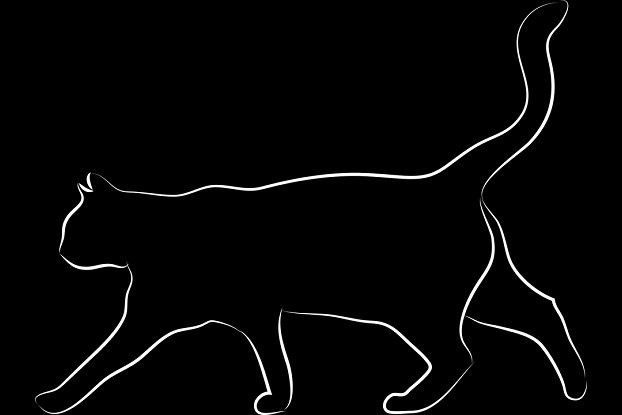
Balaram Pandey, Jairam Shastri, and Shivaram Chowby. My father bestowed these imperial names onto our three cats. My feline brothers.
Prativadi Venkata loved them beyond the sensible, inter-species sense. My father referred to our cats as family, offering them a sympathetic “Koduku,” the word for son in Telugu, as their patrolling meows filled our Middle America home.
“Koduku no, you can’t go outside, I am sorry. We cannot always get what we want in this life; this is just how it is.”
He gave such consolations with knowing and tender somberness, cultivated by the nursing of his own vanished wants and abandoned dreams. A long legal battle with the local University over tenure left him jobless for decades.
Crazy. Eccentric. A lunatic, they said.
Discrimination, racism, he said.
He knew well, how life’s losses could have a way of feeding a hungered, forward and forever-momentum.
He had come to the U.S. with two doctorates from one of Western civilization’s most prestigious universities. His dream was to continue cancer research, but he alienated American university colleagues with ardently idealistic criticisms. He seemed to know nothing of “soft skills,” relationship management,” and office diplomacy. Forceful and impassioned, impractical and brown. He stepped out of his place one too many times.
“Forceful and impassioned, impractical and brown. He stepped out of his place one too many times.”
And so he would hurl into long, low-pitched “whisper- shouts” as he paced about in our home. “You so-called scientists focus too much on treatment and not prevention. Cancer research is big business in this country….” His mind was steeped in another timescape, swallowed by the pursuit of admonishing spectral adversaries.
“Your dad talks to himself,” Heather, my nine-year-old classmate said to me, during one of our after school play dates.
“No, he doesn’t. He is practicing for a speech.” The coolness of my retort hid the rising fever of shame growing across my chest. The art of concealment became confounded with the sublimation of distress.
Before the honoring of diversity. Before the Internet. Before Skype. Before “faculty of color” happy hours. Before the cultural community center. Before fawning Facebook shout outs. Before healing circles and community conversations. Before there were these sanity-saving corridors of connection, he had only the perseverative chambers of his mind.
He talked to himself and our cats incessantly. Threading his life into theirs, he seemed to discover the solace of being joined in the universal decree of suffering.
He refused to neuter them. Our vet, the sympathetic Dr. Sharma tried to warn us. My father refused to listen. “It’s a sin. They have feelings; I can’t do it. How can I mutilate their God-given nature?” he asked.
“Before there were these sanity-saving corridors of connection, he had only the perseverative chambers of his mind.”
They destroyed our home. My mom’s carefully hung curtains and patiently chosen furniture became targeted territories of their salvaged masculinity.
Walking through the front door, the air clutched our nostrils with damp and acrid tones. Mustard seeds mingled with methi leaves. Overtones of cat urine and Pine Sol.
He persisted. “We never had to do such things in India,” Cats don’t need surgeries, they can be as God created them.”
Derivatives of the divine. That was what they were to him. That was what all non-human animals were to him.
Cats, dogs, snakes and spiders populated his stories of childhood. A family of cobras quietly existed in the eaves of his parent’s home, he recounted, “They never came down to bother us; they were too afraid of all the cats and kittens we had.”
Then he told us of running to the bloated banks of the river after heavy rains. He and his friend Gopaldu embarked on insect rescue missions.
My imagination traced his tellings. Two small boys crouched in fresh wet red river mud — suspending twigs out into the humming currents of the Yelaru river, deftly trawling the waters before plucking out a drowning ant, spider or roach. Each small, struggling life was carefully cupped in hands and softly resuscitated with their breaths.
“I measured the mad excess of kindness against the normal of being impervious to suffering.”
“We blew on them to dry them off,” he would reminisce. “Homemade Oxygen chamber!” he’d laugh.
Last week, I sat among colleagues, as the tiny chirps of an unlucky mouse speckled our meeting. Dying in a punishing trap, its faint sounds became cryptic punch lines, eliciting the easy mockery of my fellow humans. Distracted, saddened, and burdened, I plotted how I could engineer this creature’s escape. I measured the mad excess of kindness against the normal of being impervious to suffering.
This man, the crazy cat man of Kakinada, has been my steady companion even two decades after his death. Perception and identity, my seeing and being, have been contoured by the notion that even the smallest of existences have significance.
The way-ward spider, the late season ladybug. Stray city dogs, factory farms, and vanishing species. These are the grains of daily obsessions and the bread of nightly prayers. I am my father’s daughter.
* * *
B. Andal Acharya lives and works in the mid-west as a mental health professional. Her life loves include yoga, music and animals.












